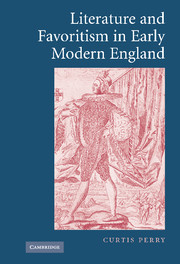Book contents
- Frontmatter
- Contents
- Acknowledgments
- A note on texts
- 1 “Prerogative pleasures”: favoritism and monarchy in early modern England
- 2 Leicester and his ghosts
- 3 Amici principis: imagining the good favorite
- 4 Poisoning favor
- 5 Erotic favoritism as a language of corruption in early modern drama
- 6 “What pleased the prince”: Edward II and the imbalanced constitution
- 7 Instrumental favoritism and the uses of Roman history
- Afterword: “In a true sense there is no Monarchy”
- Notes
- Index
5 - Erotic favoritism as a language of corruption in early modern drama
Published online by Cambridge University Press: 22 September 2009
- Frontmatter
- Contents
- Acknowledgments
- A note on texts
- 1 “Prerogative pleasures”: favoritism and monarchy in early modern England
- 2 Leicester and his ghosts
- 3 Amici principis: imagining the good favorite
- 4 Poisoning favor
- 5 Erotic favoritism as a language of corruption in early modern drama
- 6 “What pleased the prince”: Edward II and the imbalanced constitution
- 7 Instrumental favoritism and the uses of Roman history
- Afterword: “In a true sense there is no Monarchy”
- Notes
- Index
Summary
In Shakespeare's Measure for Measure, Lucio – a figure who embodies the volatility of informal public discourse – invents a series of sexual libels about the absent Duke Vincentio. As part of his distinctly carnivalesque string of slanders, Lucio refers to Vincentio as “the old fantastical Duke of dark corners.” One knows, in a general way, what Lucio means: that for all his august public authority, Vincentio enjoys the pleasures of the flesh overmuch in private. What interests me about the joke, though, is the way it imagines the unseen as automatically sexually suspect. The point is not that Lucio knows anything or even insinuates anything specific, but rather that, in a culture that imagined a link between public authority and moral transparency, hiddenness as such is always available for scandalous interpretation. King James, in Basilikon Doran, opined that kings should be careful “not to harbor the secretest thought in their mind,” and the idea behind this extreme-sounding formulation is that the rule of a good king hinges upon his total self-government. Inner life should be so rigorously ordered that passions and affections, rather than being allowed to fester in secret, are subjugated to the orthodoxies of public canons of virtue. Lucio's joke supplements the commonplace ideological fantasy implicit in James's remark, reminding us that this way of thinking about virtue generates, by a kind of structural imperative, the suspicion that unseen aspects of the lives of rulers might be outlets for their ungoverned passions.
- Type
- Chapter
- Information
- Literature and Favoritism in Early Modern England , pp. 131 - 184Publisher: Cambridge University PressPrint publication year: 2006



